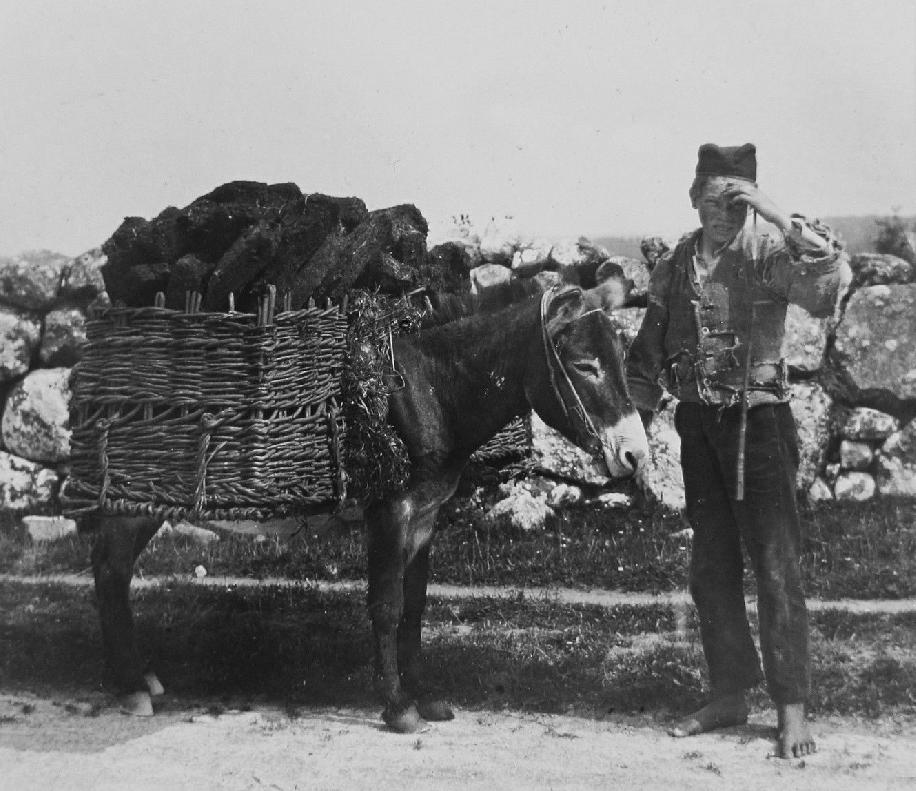
Figure 1.--Ireland is a rich agricultural land, but few natural resources. One of the few resources it did have was peat. This magic lantern slide shows an Irish boy and his donkey carrying a load of peat around 1890. |

|
English efforts to rule Ireland began after the Normand conquest of England (1066). A century later, the Normans invaded Ireland (1168). King Henry II himself landed in Waterford (1171). Henry encouraged his barons to seize control of Ireland. He made extensive land grants. Henry also awarded Ireland to his youngest son, King John. This brought Ireland under the direct control of the English Crown. This set of tension between the Crown and the Barons. English kings vied with the Bafons for control of Ireland (13th century). Ireland seemed on the path to English domination as was Wales and the Lowland Scotts. The Plague (Black Death) which swept over Europe finally reached Ireland (1340s). The Plague measurably reduced the Norman/English influence on Ireland. The Normans/Irish lived along the coast and were most involved in commerce and thus exposed to the Plague. The native Irish dominated the interior and were thus involved with commerce, thus less exposed to the Plague. As a result, Gaelic (Celtic) language and traditions once again dominated the island. Central English authority had essentially disappeared (late-15th century). The Norman barons that remained had become culturally Irish in most instances. King Henry VIII upgraded Ireland from a lordship to a kingdom and had the Irish Parliament proclaim him King of Ireland. Henry also broke the English Church away from Rome. And as the English Church moved toward Protestantism, religious division was added to the national conflict beteen England and Ireland. Elizabeth I launched a renewed English effiort to subgegate Ireland. King James I launched the Irish Plantations. This was the colonization of Ulster by Lowland Scotts and other reliable Protestants to implant amore loyal populstion than the native Irish. The English confiscated the lands of the Gaelic clans and turned them over to English landlords and the Ulster Scotts. (The Ulsrer Scotts are called the Scotts-Irish in America.) It is at third time that the potato brought to Europe by the spanish began to reach Ireland. The native Irish in the nkrth became employees or tebanbts of the settlers. English policies toward the settlers varied and rissing taxes and rents weakened the plantation system. The Ulster Scotts, but not the native Irish began emigrating to America. The struggle began with the Glorious Revolution was finally settled by the defeat of James II in Ireland. As a result, the native Catholic Irish lost their property and political rights. Much of the grain and other agricultural production was exportd to Britain. The Irish peasantry became very depedndent on the potato. The Industrial Revolution which began in Britain (mid-19th century) did not have a major impact on Ireland. The failure of the potato crop resulted in the Potato Famine. Large numbers of Irish peasants died (1840s). Many emigrated to America and England. Populations throughout Europe increased beginning in the 16th centut=ry. The potato was a major factor. Ireland was the obly countrt whose population eclined in the 19th century. There was some industrial development in Ulster.
Navigate the Boys' Historical Clothing Web Site:
[Return to the Main Irish economy page]
[Return to the Main Irish page]
[Return to the Main European country economy page]
[About Us]
[Introduction]
[Animals]
[Biographies]
[Chronology]
[Climatology]
[Clothing]
[Disease and Health]
[Economics]
[Ethnicity]
[Geography]
[History]
[Human Nature]
[Law]
[Nationalism]
[Presidents]
[Religion]
[Royalty]
[Science]
[Social Class]
[Bibliographies]
[Contributions]
[FAQs]
[Glossaries]
[Images]
[Links]
[Registration]
[Tools]
[Children in History Home]
Navigate the Boys' Historical Clothing kilt pages:
[Scottish kilts]
[Scottish boys clothing]
[Scottish school uniform]
[Highland dance]
[Irish kilts]
[Irish step dancing]
[Pipe bands]
[Greek kilts]